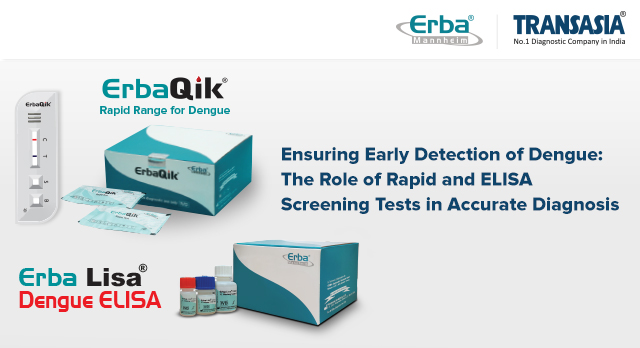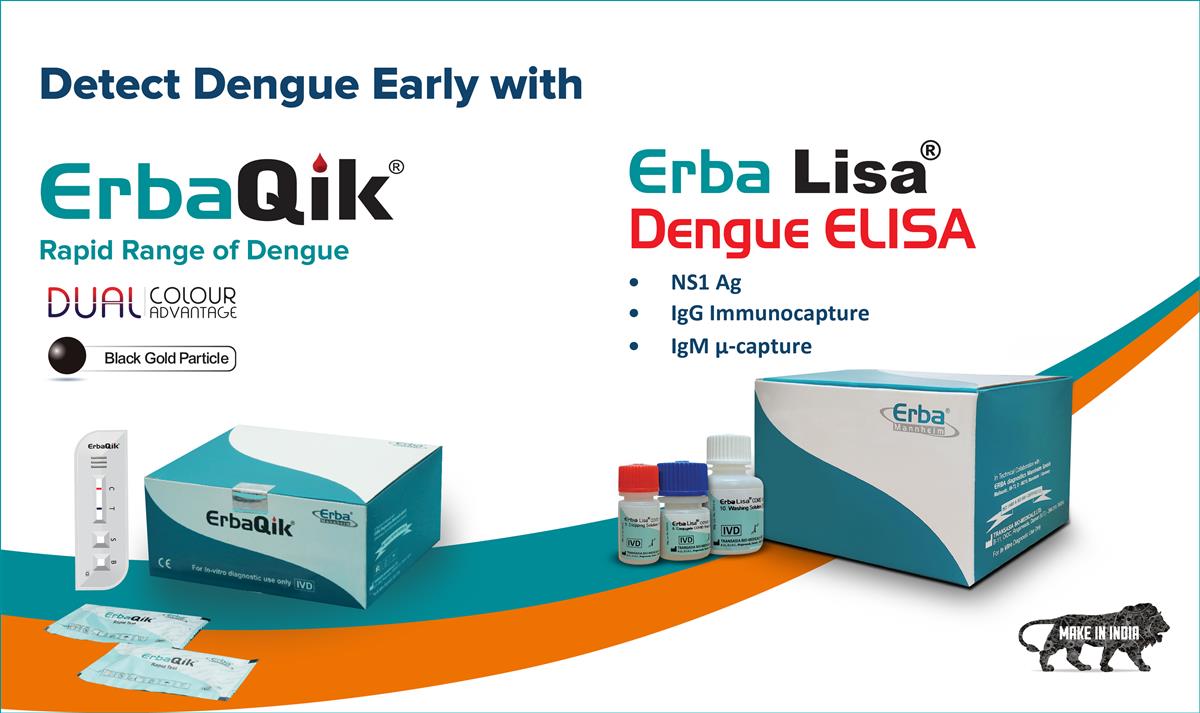Timely and Accurate Dengue Diagnosis: The Impact of Rapid and ELISA Screening Tests

Dengue fever, a mosquito-borne viral infection, poses a significant health threat in many tropical and subtropical regions. More than a hundred thousand dengue cases are diagnosed in India annually, and about half of the country’s population carries dengue virus-specific antibodies.1 The rapid escalation of dengue cases worldwide underscores the necessity for timely and precise diagnostic methods. Early detection is crucial not only for effective patient management but also for controlling the spread of the disease. Rapid Diagnostic Tests (RDTs) and ELISA tests serve as pivotal tools in the timely diagnosis of dengue, offering a swift and accurate alternative to traditional laboratory methods.
Understanding Dengue and Its Challenges
Dengue is caused by the dengue virus (DENV), which has four distinct serotypes (DENV-1, DENV-2, DENV-3, and DENV-4). The infection can range from mild dengue fever to severe forms such as dengue hemorrhagic fever (DHF) and dengue shock syndrome (DSS). Symptoms typically appear 4-10 days after a mosquito bite and include high fever, severe headache, pain behind the eyes, joint and muscle pain, rash, and mild bleeding. Severe cases can be life-threatening due to plasma leakage, fluid accumulation, respiratory distress, severe bleeding, or organ impairment.
One of the primary challenges in managing dengue is its non-specific early symptoms, which can be easily mistaken for other febrile illnesses such as influenza or malaria. This similarity makes timely and accurate diagnosis critical to initiating appropriate treatment and interventions.
ELISA tests and Dengue detection
ELISA (Enzyme-Linked Immunosorbent Assay) tests play a crucial role in the detection of dengue virus by targeting different markers: IgG, IgM, and NS1 antigen (Ag). The NS1 Ag ELISA is used for early detection of dengue infection, as it can identify the presence of the virus within the first few days of symptom onset. IgM ELISA is essential for diagnosing acute dengue infection, typically detectable from the fifth day of illness. IgG ELISA, on the other hand, helps in identifying past infections and monitoring long-term immunity, becoming detectable later in the infection and persisting for life. Together, these tests provide a comprehensive diagnostic approach, helping in early detection, confirmation of current infection, and understanding immune status in patients.
The techniques used in ELISA tests for IgM and IgG detection
µ-Capture (MAC) Technique
The µ-Capture (MAC) technique detects Dengue-specific IgM antibodies by binding them to immobilized capture antibodies on a microplate. After adding an enzyme-linked detection antibody and substrate, a color change indicates the presence of IgM, enabling early diagnosis around 4-5 days after symptom onset.
Immunocapture (GAC) Method
The immunocapture (GAC) method detects IgG antibodies by capturing them with anti-human IgG antibodies on a solid surface. An enzyme-linked detection antibody and substrate are added, causing a color change proportional to IgG levels, which helps identify past infections and distinguish between primary and secondary dengue infections.
ELISA (Enzyme-Linked Immunosorbent Assay) screening tests are vital for early dengue detection due to their high sensitivity and specificity. ELISA tests can differentiate between dengue and other febrile illnesses, aiding in accurate diagnosis.
Rapid Diagnostic Tests (RDTs) for Dengue detection
Rapid Diagnostic Tests have revolutionized the approach to dengue diagnosis. These tests are designed to be easy to use, providing results in as little as 15-20 minutes. They can be administered at the point of care without the need for sophisticated laboratory equipment or highly trained personnel. RDTs typically detect dengue virus antigens (such as NS1) or dengue-specific antibodies (IgM and IgG).
NS1 antigen detection identifies dengue early, from the first day of fever up to day 9, enabling prompt intervention to reduce severe disease risk. IgM antibodies, appearing around days 4-5, indicate recent infection, while IgG antibodies, appearing later and persisting for years, indicate past infection. Detecting these antibodies helps distinguish between primary and secondary infections, crucial for effective clinical management.
The primary advantage of RDTs is their ability to provide quick results, enabling healthcare providers to make immediate clinical decisions. Additionally, these tests are cost-effective and can be deployed in resource-limited settings where laboratory infrastructure is inadequate. This accessibility makes RDTs an indispensable tool in dengue-endemic regions, improving patient outcomes and aiding public health efforts in controlling outbreaks.
Erba Transasia’s Effective Diagnostic Solutions for Dengue Detection
At Erba Transasia, we offer a comprehensive array of highly sensitive and specific Rapid and ELISA screening kits designed for the detection of Dengue NS1 Antigen, IgG, and IgM antibodies.
Our Rapid kits include ErbaQik Dengue Duo, ErbaQik Dengue NS1 Ag, and ErbaQik Dengue IgG/IgM. The ErbaQik Dengue Duo is a one-step immunochromatographic assay for the detection of NS1 antigen and IgG and IgM antibodies against the dengue virus. All our rapid kits feature the Dual Colour advantage, utilizing black gold particle technology, which ensures clear interpretation and accurate results. Notably, ErbaQik rapids are the exclusive bi-color detection rapid tests available in India, offering enhanced sensitivity and specificity, and have been evaluated by the National Accreditation Board for Testing and Calibration Laboratories (NABL).
The Erba Lisa Dengue ELISA range includes Erba Lisa Dengue NS1 Ag, IgG Immunocapture, and IgM µ-Capture. The Erba Lisa Dengue NS1 Ag employs a sandwich Enzyme-Linked Immunosorbent Assay (ELISA) method for the detection of NS1 antigen. Additionally, the kit includes components for the detection of Dengue IgM using the µ-Capture (MAC) technique and Dengue IgG through the immunocapture (GAC) method. This refined portfolio ensures precise and reliable results in the diagnosis of dengue virus infections.

In the battle against dengue, timely and accurate diagnosis is vital. Rapid Diagnostic Tests offer an effective solution, providing quick, reliable results that are crucial for early treatment and disease management. As the global burden of dengue continues to rise, the integration of RDTs into routine clinical practice and public health strategies will be essential in mitigating the impact of this pervasive disease.
Reference:
- Jagtap S, Pattabiraman C, Sankaradoss A, Krishna S, Roy R. Evolutionary dynamics of dengue virus in India. PLoS Pathog. 2023;19(4):e1010862. Published 2023 Apr 3.